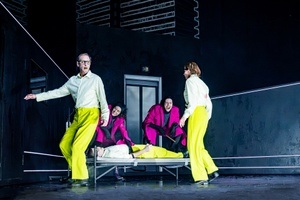Maria Stuart
In the organizer's words:
MARIA STUART
by Friedrich Schiller
Premiere May 17, 2024
Residenztheater
Age recommendation: from 14 years
Mary Stuart, the dethroned Scottish queen, seeks asylum in England, but soon finds herself imprisoned in a fortress as her aunt, Queen Elizabeth Tudor of England, begins investigations against her: Maria was allegedly involved in the murder of her husband at the age of seventeen - according to the official accusation, but rumor has it that she was also involved in a very recent plot to overthrow her. Schiller does not portray any of his protagonists in a particularly flattering light: Maria as an impulsive seductress, Elisabeth as a jealous and decision-shy regent. He writes to Goethe in 1799 about his "poetic struggle with the historical material" before he succeeds in "giving the imagination freedom over history". And this freedom also consists of turning the popular "Virgin Queen" - who during her reign pacified years of quarrels with France, consolidated the national budget, laid the foundations for naval power and the Commonwealth, created a heyday for the arts and sciences - into a procrastinator who would rather die than decide on the conflict with Mary. Here, Schiller's own present also inscribes itself into the play, in which Marie Antoinette met her end on the scaffold a few years earlier as one of the front women of absolutism: "This land, my lady, has in recent times / Seen more of the royal women descend from the throne / To the scaffold of blood". For in the background of this political thriller about succession to office and state confession, the popular uprising is always lurking, which could ultimately cost both queens their collars.
Schiller makes not only the court, but also his majesties themselves doubt whether a single person is capable of making decisions in the interests of the people, and he acts out this "fear, the terrible accompaniment of tyranny" in all its shades. In this way, he not only writes a play about the hesitation of a ruler, but also about the necessity of democracy. It is perhaps no coincidence that this debate begins, as in the ancient "Oresteia", with the murder of a husband and ends in the madness of the individual's decision.
"A play about NOT acting. About the radical loneliness and inescapable (inescapable) power into which a human ruler falls. I am interested in this woman's fascination with the other, in recognizing herself in the other. And her eventual actions in spite of this, driven by an inherently wrong system in which there can only be one decision." Nora Schlocker
Accompanying theater education program
Are you planning a visit to the theater with schoolchildren, students or another group and would like an accompanying theater education program? Write to resi.alle@residenztheater.de
ARTISTIC DIRECTION
Production Nora Schlocker
Stage Irina Schicketanz
Costumes Jana Findeklee, Joki Tewes
Composition and sound design Philipp Weber
Lighting Gerrit Jurda
Choreography and bodywork Sabina Perry
Dramaturgy Constanze Kargl
This content has been machine translated.Price information:
Student ticket 10€













